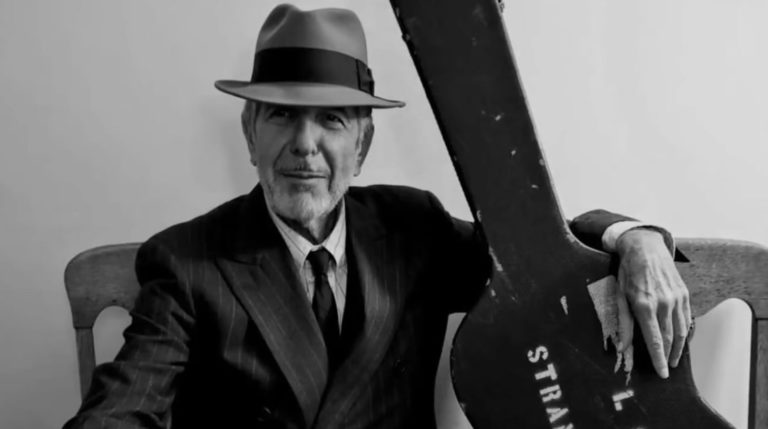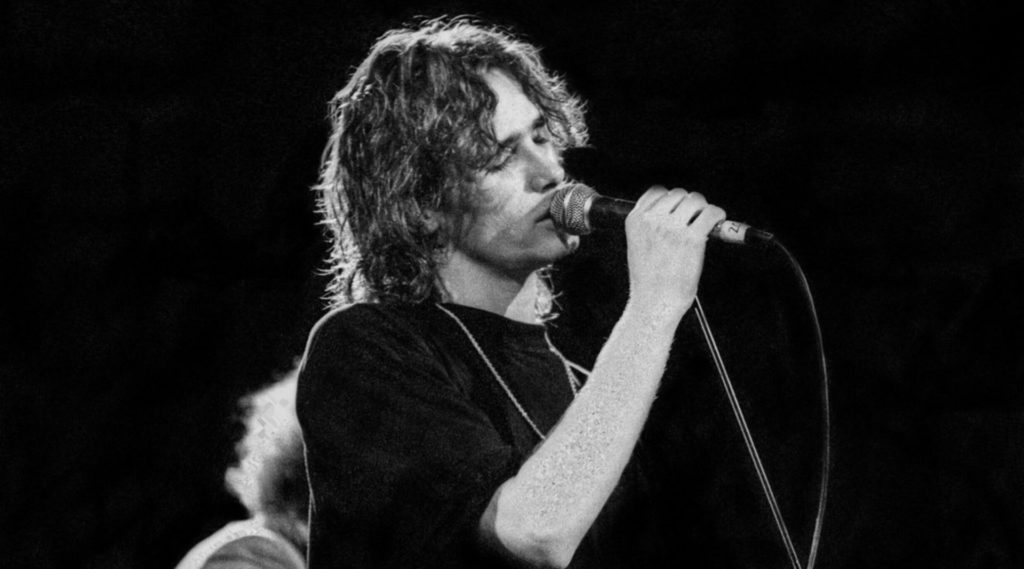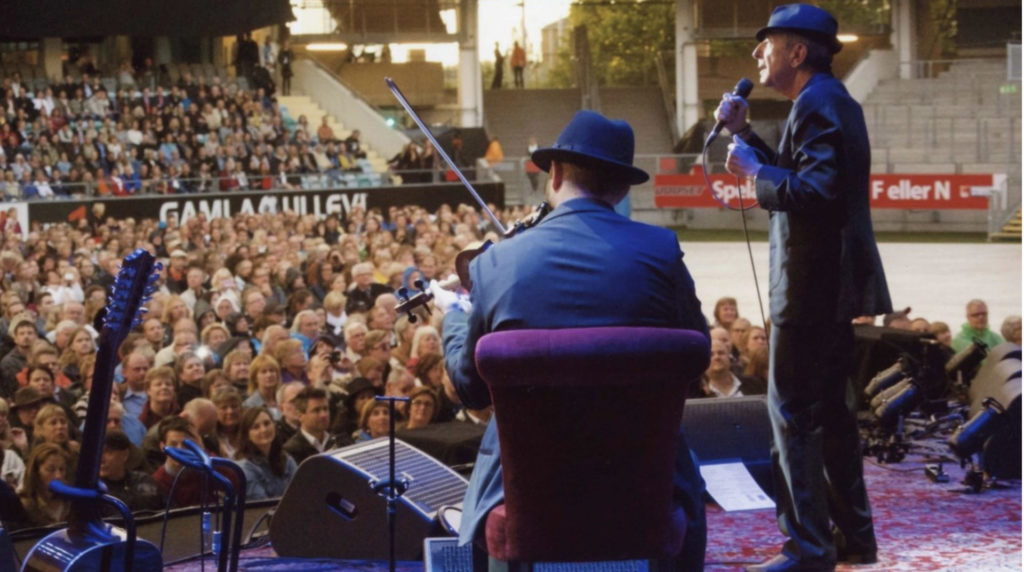
Synopsis : Hallelujah: Leonard Cohen, A Journey, A Song is a definitive exploration of singer-songwriter Leonard Cohen as seen through the prism of his internationally renowned hymn, Hallelujah. This feature-length documentary weaves together three creative strands: The songwriter and his times. The song’s dramatic journey from record label reject to chart-topping hit. And moving testimonies from major recording artists for whom Hallelujah has become a personal touchtone.

Exclusive Interview with Directors Daniel Geller and Dayna Goldfine
Q: What was your first encounter with Leonard Cohen’s music? What was your first impression, and how did that lead to the making of this film?
Dayna Goldfire : Obviously, as a girl growing up, I knew about Leonard Cohen and about “Suzanne.” I knew people were covering his work. But for me, the first connection to his music, where I would say I was profoundly moved — and I almost would say life-changing — was when we went to see him in concert in Oakland, California in 2009. Friends took us, they said, “Leonard’s coming to town. If you’ve never been to a Leonard Cohen concert, you can’t miss this. We’re buying you tickets.”
I had literally never seen a show like that before in my life. It was like a religious experience. He was such a great, great performer. As Sharon Robinson says towards the end of our movie, Leonard brought everything he had to the stage. And you felt it as an audience member.
Q: Even though this film covers a lot of Leonard Cohen’s personal life as an artist in a biographical way, you also include the influence of his music, “Hallelujah,” on other musicians. This is different from other documentaries — how did you decide to take that angle?
Daniel Geller : I think because some films have been made that trace at least certain parts of his life thoroughly — not his entire life, but certain parts of it — and were nicely done. Also, a straight-ahead music documentary didn’t seem all that interesting.
Even before considering this project, it was something that Dayna or I ever thought of being interested in making.
A lot of them are formulaic. I think what happened here is that having seen those concerts, and later, when someone mentioned an idea of a movie about a song — just as an offhand comment — Dayna thought, “Well, what about that song ‘Hallelujah’ which we saw Leonard perform?”
From the get-go we understood well that that was a spiritual experience — if you want to call it that — in the theater listening to him sing. We went two different times. The song has all sorts of spiritual hooks in it — about searching, contradiction, carnal, holy and broken, all at once. And it would seem like a really interesting lens — to look at Leonard’s life through that song.
Now the song is a great story song because of its own arc — how long it took to write; that It got rejected; that it came back up through unlikely circumstances; and that it provided at least a plot framework that could carry a story along.
We were also looking at something that’s a little more ephemeral, a little more esoteric, which is someone’s personal search for some sense of his place in the universe, some relationship to the Creator, some grappling with his own sense of brokenness about something that needed to be healed. So from the beginning, we knew that we were going to do something that was very unusual. And the challenge would be to do it in a way that you felt [that you experienced] enough of Leonard’s progression through life that you don’t need an entire biography, but you get enough of it along that way. That’s the important thing.
Dayna Goldfire : We didn’t want to make a series about Leonard Cohen. It’s the hot thing to do right now, if you turn on Netflix on any given night, there’s a series about this and about that. But I think there’s something about taking on the assignment of needing to be concise. I don’t know, it felt like, Let’s just give ourselves that assignment. We’ll look at Leonard Cohen through the prism of his most iconic song.
One of our theories is, if you really look at that song and all the verses, it incorporates so much of who Leonard Cohen was — whether it’s spiritual, sexual or life-pondering. So it was a challenge to ourselves, I think — could we make a viable film that’s feature-length where you get a sense of who Leonard Cohen is, but don’t have to start with the moment he was born.
Q: He started writing his songs when he was 30 years old. He was a poet, and also wrote two novels, “The Favorite Game” and then “Beautiful Losers,” which didn’t do so well. Why did he take so long to express himself through the music?
Dayna Goldfire : I heard different answers from him. Sometimes he would say, “Well, I couldn’t really make it even if my book of poems was a bestseller, it wasn’t enough to live on.” So sometimes he would say that. But I think that that’s too simplistic an answer.
Daniel Geller : Well, he says one thing in that CPC interview with Adrian Clarkson from 1966 — I’ll paraphrase a bit — that the boundaries are falling between things. If you feel like you can lay your hand on something and you can do it reasonably well, then there’s no reason why you shouldn’t be able to cross those boundaries.
With Leonard, there’s usually not one simple answer to any thought, decision or question he’s posing. It’s a multiplicity of things. What would have happened if Judy Collins had not given him encouragement? Maybe he would have stuck around New York a little bit more and never become a singer-songwriter. Or maybe he would have done it anyway. I do think, more than anything at that moment — particularly at that moment of the creative world foment of the mid- to late-1960s — there was a sense of people crossing in and out of each other’s art forms.
Dayna Goldfire : I think that as one goes through life, there are these serendipities and unpredictable junctions when your life bumps up against something and transforms into something else. The trajectory of the song “Hallelujah” is a great example of that.
The trajectory of Leonard’s life was such a life well-lived — a life spent in the arts, spent going through a spiritual journey, spent really examining whatever is this thing called “life” and the world we find ourselves in.
It’s a good metaphor for the way we kind of bumble along, and then, if we’re open enough and focused enough on what’s going on around us, we can take advantage of these little synchronicities that happen.
Daniel Geller : I also think of something else that’s just dawning on me. He mentions in the film that he would stand next to his tall uncles, who were cantors. In the Jewish tradition, there’s the rabbi, who is a teacher — not a priest, a rabbi — who is reading the liturgy; and then there is a cantor, a singer, who is singing these beautiful psalms and other songs. So right away you’ve got this intersection of liturgy and music.
Growing up in that synagogue, with a grandfather who is singing, even if it’s not a song, the traditional orthodox, old-style way of reading from the Torah — the Old Testament books — in this semitone. You don’t read it, you chant it out loud [demonstrates] you actually chant your way. So right away, the notion of words, of liturgy which he is consumed with, is fused with a musical experience. The more I think about it, it’s almost inevitable that he is somehow going to find his way over to the fusion of poetry and music.

Q: He was discovered by Columbia Records’ Jon Hammond, who also discovered Bob Dylan. But Hammond didn’t produce Cohen’s music — a young producer John Simon did.
Would that have made much of a difference as far as his career?
Daniel Geller : There was nothing like a marketing department trying to categorize things into a very small compartment. Leonard’s work was difficult. It’s easier to dismiss it, to say “What am I going to do with this guy? Let’s just call him another Bob Dylan.”
Dayna Goldfire : Well, that’s what Marketing did. They wanted to categorize…
Daniel Geller : That’s what I’m saying. But you stop and think about the lyrics, they’re difficult. They’re brilliant, they’re beautiful, but they’re difficult. They’re not even at the level of accessibility of Bob Dylan lyrics. Dylan is brilliant also, but his lyrics generally are more straightforward. They paint stories and pictures so beautifully. Leonard’s lyrics are drilling down inside something. They ask the listener of pop music a fairly big ask.
Q: When Cohen made his second album, he went to Franklin, Tennessee, to a mountain top, to seclude himself and pursue his artistic vision, so his work would evolve. And he did also serve as a Zen Monk for 6 years, do you think he always seclude himself to gain an artistic evolvement?
Dayna Goldfire : That’s really interesting. I don’t know.
Daniel Geller : He clearly was an introspective man who could get distracted by the material world around him. And some of the songs really talk about that — the ones where he gets really serious and introspective and figure out things in life, but then being distracted by wine, women and song, so to speak.
The need to isolate goes back to the temptation of St. Anthony [of Egypt], to isolate in order to allow the Bat Kol, as the rabbi says, the feminine extension of God, the creative force, into the human mind. You do need to be “quiet” to do that.
Dayna Goldfire : As charismatic and beloved as Leonard was, I think he was very comfortable spending time by himself. He craved and needed that. It’s why there are four hundred journals. He spent a lot of time by himself, alone in a room, as he would say, “blackening pages” and doing rituals, whether it was his Zen Buddhist practice or his Judaism. It’s all an extension of who he was as a person — he needed a certain amount of privacy.

Q: He always had back-up singers and back-up groups that often toured with him. Do you think his success was due to the profound effect his concerts had on audiences because he created such a community around him?
Daniel Geller : I don’t know. Robert Kory — Leonard’s manager who helped him after everything had fallen apart — said to us that he asked Leonard, when Leonard was thinking about going back on tour, what he felt was missing about him as a live performer. He was asked what he would want or need. The answer came down to a lot of rehearsal time.
So there’s the team you’re talking about — he hand-picked the musicians, every song and every note, his arranger and musical director. As important as anything else, he walled-off the backstage so that nobody — it didn’t matter who you were, how famous you were, or how long you knew Leonard — would be permitted backstage. There was to be total quiet, focus and concentration. As a serious artist, there was to be no fans, no knocking on the door.
I think that also created a bubble for his team. They were living in an intensely private musical world. For me, having seen their concerts twice, you felt that. You felt something very different was happening within that band, and they were living it onstage as a unit.
For Sharon Robinson — who has become a friend of ours now — to go back to the tours in 1979 as a very young singer, and then return to the tours after making several albums, co-writing with him, and go on the road again in the mid-2000s, suggests something about Leonard’s loyalty to creators he respected. He would hang on to them as a family.
Q: This film presents not only a biographical story , but also the experience of a great artist. What do you want the audience to take away from this wonderful film?
Dayna Goldfire : I hope it’s taken them on a spiritual journey. I would love it if people who had never heard Leonard Cohen before, but are brought to the theater to see it, walk away wanting to dive deeply into his catalog.
It’s really exciting that, on the one hand, we’re sneaky; we get people in because it’s about this song “Hallelujah” but we also snuck in another 22 Leonard Cohen songs. And there’s a companion album that’s just dropped and is coming out in a real material album form in the fall. I would say it’s a one-two punch. I want them to fall in love with Leonard and go along on his emotional and spiritual journey.
Daniel Geller : In all our films, ultimately, there’s the subject of the film and then there’s the emotional experience of the film. Cinema is so much about having an emotional experience. If you can have that riding through his life — feeling the holiness of the heights and brokenness of the disappointments, which embody all of our lives — we tried to have all that in this film.
To feel validated by his life, and having it reflect on your own life, is to say, “Yes, I’ve had bitter disappointments and it’s painful but I’ve struggled out of the darkness.” But also, to celebrate the moments that are gifts from up above, that are a joy and connection — is part of this experience as well. We’ve seen that in theaters so far: people laughing and the sniffling of tears. If you can have that experience that way with the movie, then that makes me happy.
Check out more of Nobuhiro’ articles.
Here’s the trailer of the film.

